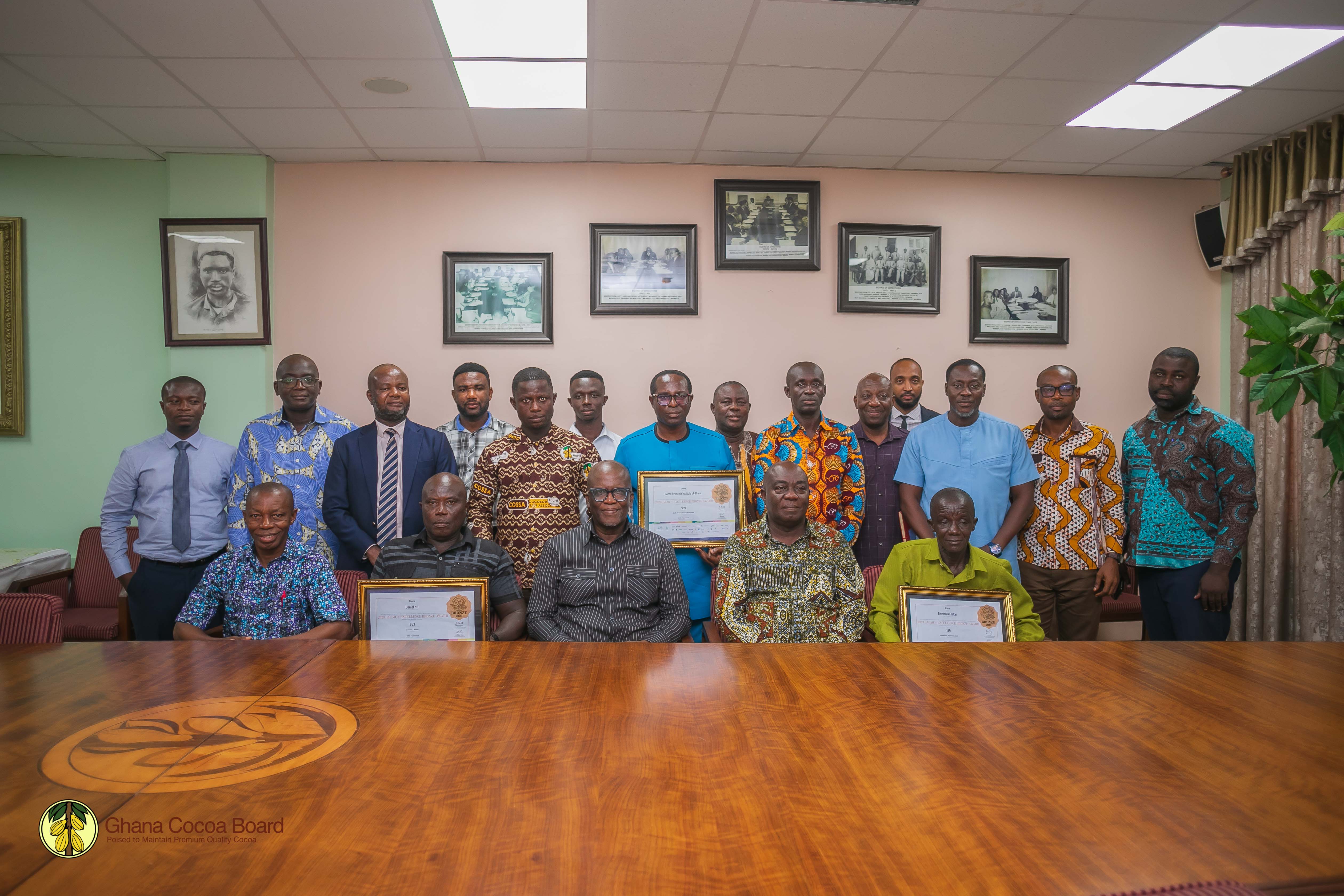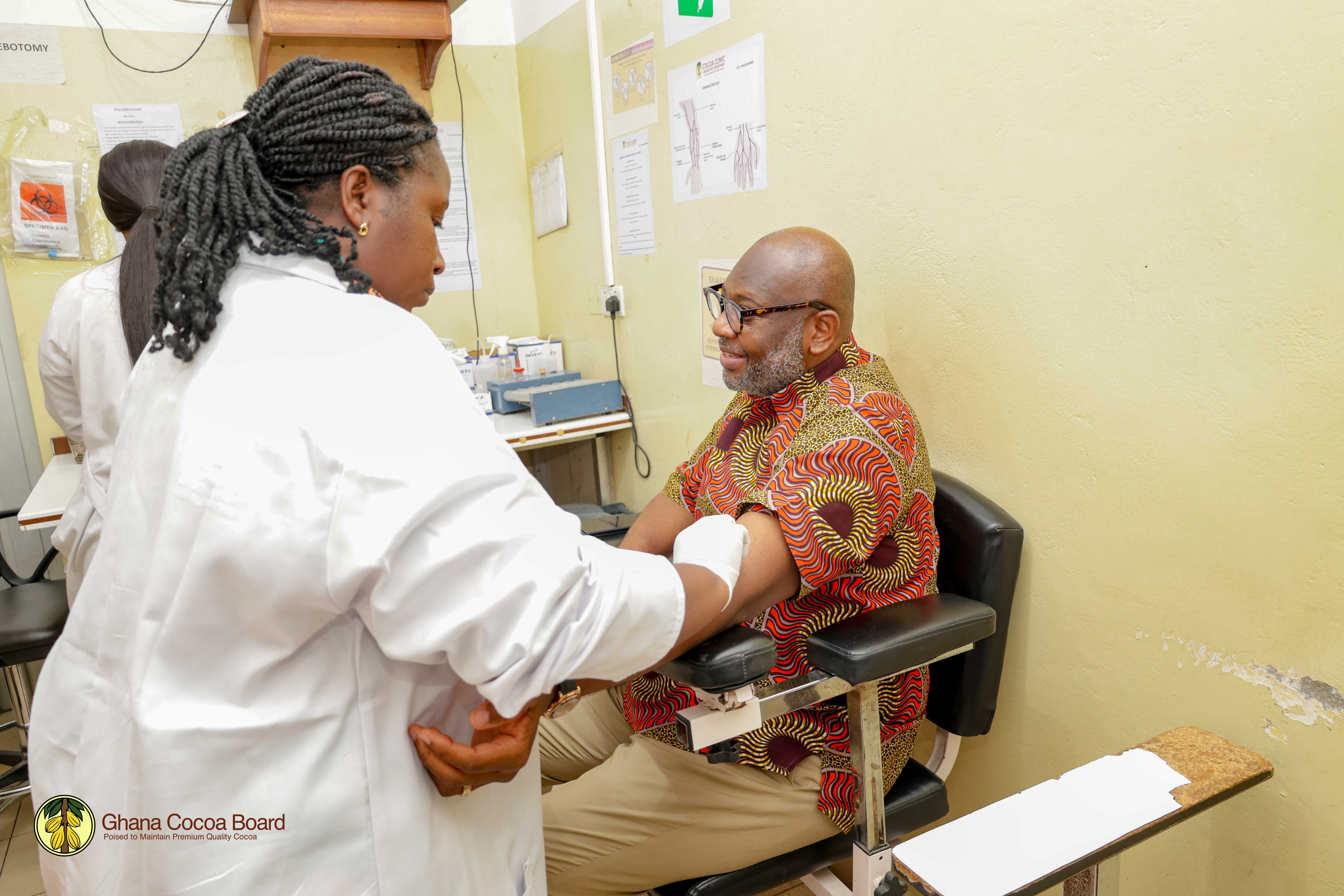COCOBOD AND ROAM TECHNOLOGY EXPLORE PARTNERSHIP TO COMBAT BLACK POD DISEASE

Date: 08th January 2024
The management of Ghana Cocoa Board (COCOBOD) has met with a delegation from Roam Technology, Belgium, to discuss a possible collaboration for the effective management of the prevalent black pod disease within the cocoa sector.
The two parties have since agreed to explore the feasibility of conducting tests on Huwa-San, an agricultural disinfectant produced by the Belgian company, as a possible treatment against Phytophthora palmivora, a destructive plant pathogen that causes diseases in a wide range of plants including black pod disease on cocoa farms across the sub-region.
Black pod disease has always presented a substantial threat to cocoa plants, inflicting severe damage to cocoa pods and the overall output of cocoa farms. The disease is characterized by the appearance of dark lesions on pods, which ultimately lead to the pods rotting. This reduces plant yields and negatively affects the livelihoods of cocoa farmers.
Scientists from the Cocoa Research Institute of Ghana (CRIG), which is the subsidiary of COCOBOD in charge of scientific research and testing of all agrochemicals before application on cocoa farms in Ghana, will be working closely with Roam Technology.
Their focus will be to conduct rigorous tests and evaluations of Huwa-San's effectiveness in controlling black pod disease before certification for application on cocoa farms.
Documents so far offered by Roam Technology showcase studies of Huwa-San's proficiency in effectively combating comparable fungal infections that affect other crops.
The documented evidence appears to show its consistent efficacy in controlling and managing fungal infections in crops like avocados, pineapples, papayas, and tobacco leaves, when applied at different stages of plant development. The studies underscored effective resistance against plant pathogens, significant reductions in plant and fruit loss, increased economic yield, extended shelf life, and an overall improved quality achieved through the application of Huwa-San.
The Deputy Chief Executive in charge of Agronomy & Quality Control at COCOBOD, Dr Ebenezer Owusu, said the management of COCOBOD is poise to find innovative approaches to effectively manage the various pests and diseases which affect cocoa trees.
He added that the results from Huwa-San’s application in other crop sectors suggest that it holds a lot of promise for the effective management of the black pod disease in cocoa, however, management will rely on the expert advice of CRIG on its efficacy on cocoa trees, the environmental impact, among others, in deciding the way forward.
COCOBOD's present approach to managing the black pod disease is carried out under the Cocoa Diseases and Pests Control Programme (CODAPEC). Through the program, COCOBOD works hand-in-hand with farmers to plan and execute spraying activities. It carries out three annual fungicide spraying exercises against black pod disease, and farmers are responsible for the rest.
To achieve optimal black pod control, it is highly recommended to conduct at least six and no more than nine sprayings each year, using COCOBOD-approved agrochemicals. This collaborative approach between COCOBOD and farmers, have so far helped to ensure the sustainable production of superior-quality cocoa in the country.
Other News / Articles you might be interested in.

COCOBOD HONOURS GHANAIAN COCOA FARMERS FOR EXCELLENCE AT INTERNATIONAL COCOA AWARDS
Management of Ghana Cocoa Board (COCOBOD) has honoured the winners of the 2023 International ...
Read More
DR. RANSFORD ABBEY LEADS BY EXAMPLE, UNDERTAKES ANNUAL MEDICAL EXAMINATION AT COCOA CLINIC
The Chief Executive of the Ghana Cocoa Board (COCOBOD), Dr. Ransford Abbey, has ...
Read More
COCOA MEDIA HUB LAUNCHED TO ENHANCE OPEN GOVERNANCE AND FARMER ENGAGEMENT
Ghana Cocoa Board, along with various stakeholders, has participated in the official launch ...
Read More